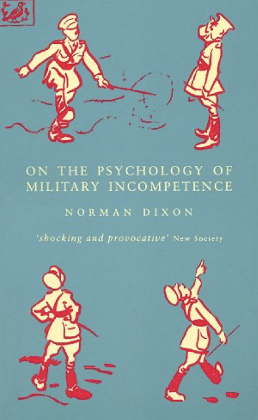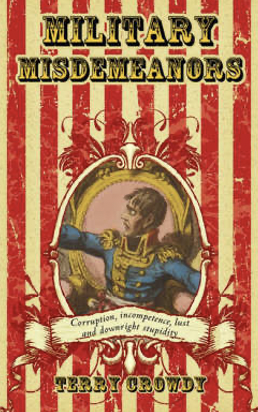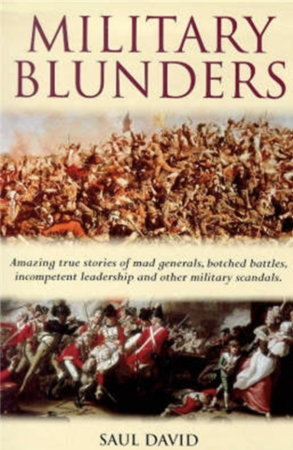Reviewing: On the Psychology of Military Incompetence by Norman Dixon (Pimlico 1976), Military Misdemeanors by Terry Crowdy (Osprey 2007) and Military Blunders by Saul David (Robinson Publishing 1997).
First question – why do I have books on military failures on my shelves? Pretty straightforward, this one. When I was researching examples of disastrous decision-making for my first book DECIDE, an obvious place to start was warfare, where, to paraphrase Bill Shankly, it is absolutely a matter of life or death.
But this is an issue of MediaCat dedicated to rogues and scoundrels in the marketing world, so why am I recommending revisiting three books on military failures?
Marketing’s roots
Largely because when marketing orientation first emerged in the 1950s, most of the pioneering thinkers and practitioners had recently been involved directly or indirectly in fighting the Second World War. No surprise then that marketing’s lexicon is stuffed with military words, like objectives, strategies, goals, targets, tactics, offensives, plans etc. Nor that two of our trade magazines are called Campaign and Drum. As Richard Huntington of Saatchi & Saatchi puts it, marketing is full of warlike language.
So far so easy to explain, but what our military-minded forebears forgot to tell us is that the failure and disaster rate in the upper reaches of the armed services is extremely high. I am suggesting you read three highly entertaining but chilling books about the more spectacular cock-ups, but there are dozens more. Maybe the early marketers should have borrowed vocabulary from science, medicine, sport or music, where many mistakes are made but not generally errors that kill many thousands.
On the Psychology of Military Incompetence by Norman Dixon
Let me share with you some of the best stories. They don’t turn those responsible necessarily into rogues or scoundrels (although some do), but the overall level of incompetence and bad judgment is staggering.

Starting with the Norman Dixon book, let’s just look at his take on the 19th century. He presents an eye-watering collection of examples of what we might call ‘derring don’t’. He starts with the Crimean War, and the spectacular ineptitude of Lord Raglan, who led the British Expeditionary Force to the peninsula, which then as now (after its recent annexation) is part of Russia. I mention this, because Raglan apparently never grasped who the enemy were, always referring to them as ‘the French’. Raglan was an odd choice for the top job – 67 years old and with no experience at all of command. Unsurprisingly he presided over Cardigan’s disastrous Charge of the Light Brigade, and extraordinarily a 35% reduction in his army’s strength during the winter that followed, when there was no fighting at all. This due to a total failure to keep the troops fed, warm and safe. His reward? Promotion to field marshal.
Generalship in the Boer War was hardly more impressive. Buller, White, Methuen and Featherstonehaugh were famously inept, but the palme d’or went to one General Gatacre, who at the battle of Stormberg Junction, chose to march at night before attacking at dawn. Unfortunately he embarked on the night march with no reconnaissance nor any officer who knew the way. As a result he found himself behind the hills he should have been in front of, and his army was lined up with their backs to the enemy. Gatacre nonetheless was celebrating only light losses (90 men), when he was informed that a further 600 men had been left behind by accident and were now prisoners of the Boers.
Dixon’s book runs to over 400 pages, and the most compelling and depressing case history is the career of Field Marshal Haig, under whose command hundreds of thousands of Allied lives were lost in the Great War, mostly for little or no territorial or strategic gain . No space here for more than three quotes:
- ‘His handling of Passchendaele betokened an obstinacy of statuesque proportions’. He disregarded advice that the Germans were expecting his extraordinary shelling offensive (four and three quarter tons of high explosive for every yard of front, delivered over ten days).
- ‘He ignored a warning that this would turn the battlefield into a sea of liquid mud, into which he launched twelve divisions’. 325,000 Allied soldiers died in that one battle.
- ‘Haig was probably the cleanest man on the Western Front.’
Military Misdemeanors by Terry Crowdy
The Crowdy book is probably the most entertaining, not least because of the author’s fascination with the lustfulness of military leaders.

One spectacular example: Ernest Augustus, Duke of Cumberland (1771-1851). This isn’t ‘Butcher Cumberland’, who preceded him by 50 years. Good old Enrest Augustus led a colourful life, fathering a child by his sister and murdering his valet. His defence for the latter event was as follows:
I was awoken by a bat landing on my head. My own sword was slashing down on me. I sent for my valet. He was found in his room with his head nearly completely cut off.
To progress to more modern times, Crowdy sheds new light on causes celebres like the U-2 scandal, the Profumo affair, the downing of KAL 007 by the Russians, James Hewitt, and the distinctly non-military career of President Clinton.
Military Blunders by Saul David
Saul David’s Military Blunders covers a broad swathe of history. Let me just mention his fresh insights into Crecy, Custer’s Last Stand, the retreat from Kabul, the first day on the Somme, the fall of Singapore, Stalingrad and Goose Green.

So much military history. So many cock-ups. And today as we try to fathom the implications of war in Europe, Chinese aggression, and the planet-ending threat from weapons of unimaginable terror, there is no reassurance that leaders and/or generals will not continue to be as dangerous as ever.
“Stick to marketing, however confusing and frustrating it has become” would be my best advice.
In case you were wondering, I looked up the derivation of ‘cock-up’. It is British English military slang dating from the 1920’s to mean something done badly or inefficiently. But don’t use it in the US, where it is distinctly ruder!
Featured image: Diego Gonzalez / Unsplash


























